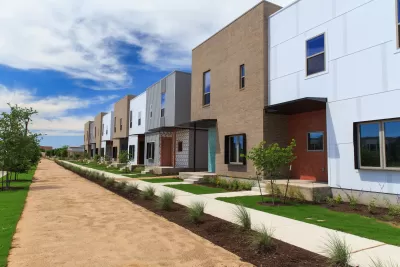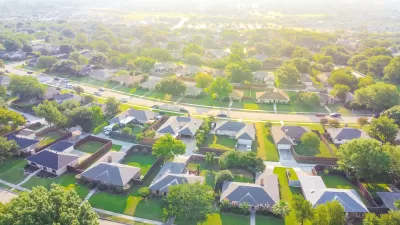The study highlights high real estate costs as well as restrictive zoning regulations and building requirements that delay multi-family construction.

New studies from the University of Texas commissioned by the city of Austin reveal the causes of high housing construction costs in the city and propose solutions for reducing them, reports Ben Thompson in Community Impact.
“Among analysts' top findings were Austin's standout costs compared to other cities, as well as the competitive local cost of multifamily versus single-family development and the elevated price tag of construction on the west side,” Thompson adds.
With the cost of land and construction materials and labor rising, city regulations that add extra costs are more likely to make or break a project, according to the study. “Although the city has sought to speed up those processes for years, builders are still experiencing the effects of a slower system that can end up passing costs along to residents.”
Researchers also found that multi-family housing is the cheapest to build, but faces the most obstacles from local building regulations and zoning codes.
Recommendations for making housing construction faster and more affordable include: implementing zoning reforms that permits more housing types, reducing labor costs through workforce training, limiting regulatory constraints such as parking requirements, and improving incentive programs for affordable housing developers.

Alabama: Trump Terminates Settlements for Black Communities Harmed By Raw Sewage
Trump deemed the landmark civil rights agreement “illegal DEI and environmental justice policy.”

Study: Maui’s Plan to Convert Vacation Rentals to Long-Term Housing Could Cause Nearly $1 Billion Economic Loss
The plan would reduce visitor accommodation by 25% resulting in 1,900 jobs lost.

Why Should We Subsidize Public Transportation?
Many public transit agencies face financial stress due to rising costs, declining fare revenue, and declining subsidies. Transit advocates must provide a strong business case for increasing public transit funding.

Wind Energy on the Rise Despite Federal Policy Reversal
The Trump administration is revoking federal support for renewable energy, but demand for new projects continues unabated.

Passengers Flock to Caltrain After Electrification
The new electric trains are running faster and more reliably, leading to strong ridership growth on the Bay Area rail system.

Texas Churches Rally Behind ‘Yes in God’s Back Yard’ Legislation
Religious leaders want the state to reduce zoning regulations to streamline leasing church-owned land to housing developers.
Urban Design for Planners 1: Software Tools
This six-course series explores essential urban design concepts using open source software and equips planners with the tools they need to participate fully in the urban design process.
Planning for Universal Design
Learn the tools for implementing Universal Design in planning regulations.
Caltrans
Smith Gee Studio
Institute for Housing and Urban Development Studies (IHS)
City of Grandview
Harvard GSD Executive Education
Toledo-Lucas County Plan Commissions
Salt Lake City
NYU Wagner Graduate School of Public Service





























